HDR-UK Health Data Science Black Internship Programme Summer Internship with CPRU
 This summer, CPRU had the pleasure of hosting Ashleigh Onabajo, an MSc Public Health & Health Promotion student, at the UCL Institute of Child Health through the HDR-UK Health Data Science Black Internship Programme. Ashleigh conducted an exemplar analysis using publicly available data for research. Ashleigh’s project used two publicly available datasets to describe the variation in 2-2½ year health and development and Ages and Stages Questionnaire (ASQ®-3) scoring across local authorities in England for the year 2020-2021. This project contributes to the wider research being undertaken by the CPRU team looking at how we can use the individual level data on child development at age two contained in the Community Services dataset to understand trends and disparities.
This summer, CPRU had the pleasure of hosting Ashleigh Onabajo, an MSc Public Health & Health Promotion student, at the UCL Institute of Child Health through the HDR-UK Health Data Science Black Internship Programme. Ashleigh conducted an exemplar analysis using publicly available data for research. Ashleigh’s project used two publicly available datasets to describe the variation in 2-2½ year health and development and Ages and Stages Questionnaire (ASQ®-3) scoring across local authorities in England for the year 2020-2021. This project contributes to the wider research being undertaken by the CPRU team looking at how we can use the individual level data on child development at age two contained in the Community Services dataset to understand trends and disparities.
To read the full report click here: ![]() Onabajo, A. CPRU_HDR-UK
Onabajo, A. CPRU_HDR-UK
New publication: The impact of area level mental health interventions on outcomes for secondary school pupils: Evidence from the HeadStart programme in England

Abstract: In light of the dramatic rise in mental health disorders amongst adolescents seen in the past decade across the world, there is an urgent need for robust evidence on what works to combat this trend. This paper provides the first robust evaluation of the impacts on school outcomes of 6-year funding programme (HeadStart) for area-level mental health interventions for adolescents. Exploiting educational administrative data on ten cohorts of state-educated secondary school students, we use the synthetic control method to construct counterfactual outcomes for areas that received the funding. We show that the funding did not affect students’ absenteeism or academic attainment, but it prevented around 800 students (c. 10% of students typically excluded yearly) from being excluded in its first year. The transient nature of this effect suggests that sustained funding for intervention may be a necessary but not sufficient condition to maintain programme effectiveness over time.
Full article can be found here
New publication: Family adversity and health characteristics associated with intimate partner violence in children and parents presenting to health care: a population-based birth cohort study in England

We examined the associations between family adversities, health characteristics, and IPV in children and parents using linked electronic health records (EHRs) from primary and secondary care between 1 year before and 2 years after birth (the first 1000 days). We compared parental health problems in in children and parents with and without recorded IPV. Two in five of the children and parents presenting to health care had recorded parental mental health problems, parental substance misuse, adverse family environments, or high-risk presentations of maltreatment in the first 1000 days. One in 22 children and parents with family adversity also had recorded IPV before age 2 years. Primary and secondary care staff should safely ask about IPV when parents or children present with family adversity or health problems associated with IPV, and respond appropriately.
Full article can be found here
CPRU investigates the promotion of safer sleeping for babies in high-risk groups in England
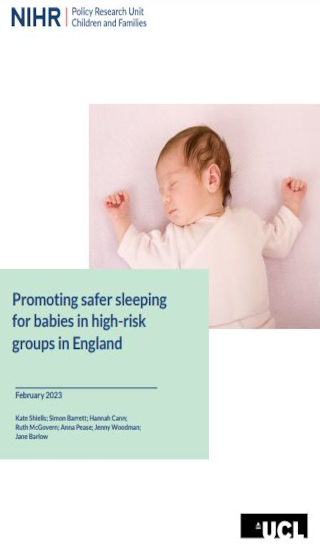
Whilst the ‘Reduce the Risks’ campaign of the 1990s resulted in a fall in the number of unexpected infant deaths, recent reports have found higher rates of deaths amongst families living in the most deprived neighbourhoods in England.
We carried out a mixed methods study of Sudden Unexpected Death in Infancy (SUDI).
Our findings suggest that change to current practice is needed if the risk of SUDI in this particular group of families is to be further reduced.
Home Office comissioned CPRU review of tools measuring the domestic violence and abuse core outcomes (DVA-COS)

Members of the core outcome set team were funded by the Home Office to review measurement tools that could be used when measuring the domestic violence and abuse core outcomes (DVA-COS). We ran an abridged consensus and review process with an international group of experts to understand which tools they felt were most feasible and acceptable to be used to evaluate child-focused domestic abuse interventions. We found that many tools are not trauma-informed and only one measurement tool met everyone’s criteria. You can read the full report here: ![]() A rapid review of outcome measurement tools related to the DVA Core Outcome Set.pdf and you can find out more about the original core outcome set project here. To access the appendices please go to the project OSF page here.
A rapid review of outcome measurement tools related to the DVA Core Outcome Set.pdf and you can find out more about the original core outcome set project here. To access the appendices please go to the project OSF page here.
What's school like for teenagers with a social worker: a conversation with care leavers in Southampton

Hannah Cann spoke to two young people about their experiences of taking GSCEs whilst also being a Looked After child. Listen to our short podcast (9 minutes) where they explain how sterotypes, seeing social workers in lesson time and bullying influence their experiences. This podcast was co-produced with the young people who we spoke to and was a partnership between CPRU and Southhampton City Council. Hannah's time was funded by a NIHR pre-doctoral Local Authority Fellowship (PLAF), you can read more about Hannah's, her role in children's social care and her research placement here.
Listen to this podcast below:
Summary of the 'research priorities for policy on child and adolescent mental health’ from the Catherine Peckham Symposium is now available
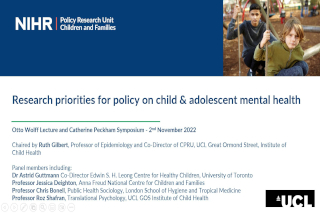
We would again like to thank everyone who was able to attend the Otto Wolff Lecture and Catherine Peckham Symposium focused on the power of data for child and family mental health research. A summary of the panel discussion, focused on research priorities for policy on child and adolescent mental health can be found here: ![]() research priorities for policy on child and adolescent mental health.pdf
research priorities for policy on child and adolescent mental health.pdf
Thank you to Astrid Guttmann, Jessica Deighton, Chris Bonell, Roz Shafran and all audience members, both in person and online, for engaging in these important discussions on mental health.
Recordings are now available: CPRU Otto Wolff Lecture: 'Measuring and Moving on the Child and Youth Mental Healthcare System' and the Catherine Peckham Symposium: 'The power of data for child and family mental health research'

We would like to thank everyone who was able to attend last week's events. It was very pleasing to see so many attending and the afternoon was filled with thought-provoking discussions on child, youth, parental and familial mental health. We are grateful to our speakers who shared their knowledge and expertise and everyone contributing in person and online.
All talks from the events have now been published, so those unable to attend can still view the events here: https://youtube.com/playlist?list=PLxZBmBgWXdf7gMk_8uujV6eM5pedR9CW6
New project on the inequalities in health trajectories of vulnerable adolescents as they transition into adulthood
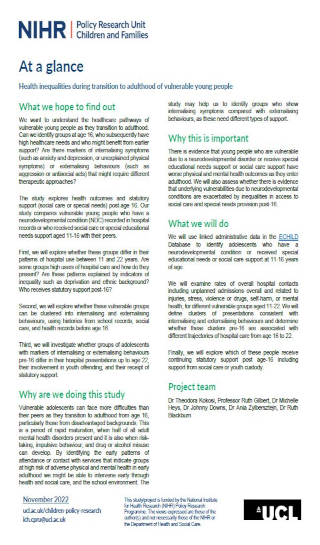
We are exploring the healthcare pathways of vulnerable young people who either have a neurodevelopmental condition or have received social and special educational needs support. We want to identify which groups have higher healthcare needs and might benefit from earlier support, whether these are exacerbated by several indicators of inequalities and whether they receive continuing statutory support post-age 16 including support from social care and youth custody.
CPRU investigates the impact of early intervention for mental health in children (HeadStart) on school absenteeism, exclusion and age 16 attainment (GCSEs) of state-educated secondary school pupils in England
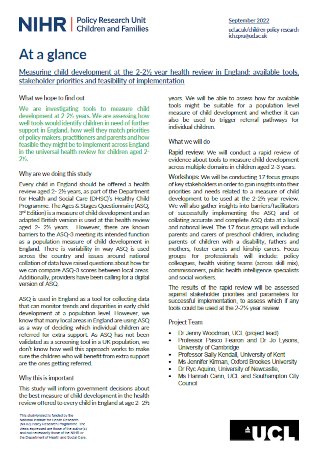
HeadStart is a six-year, £67.4 million National Lottery funded programme set up by The National Lottery Community Fund to explore and test new ways to improve the mental health and wellbeing of young people aged 10 to 16 and prevent serious mental health issues from developing. By using an evaluation methodology called the synthetic control method, we analysed routinely collected data by the Department for Education to investigate the impact of HeadStart on school absenteeism, exclusion and age 16 attainment (GCSEs) of state-educated secondary school pupils. Our results showed that HeadStart neither impacted student absenteeism nor attainment. However, HeadStart reduced exclusion rate in its first year of implementation, with this impact being on the boundary of statistical significance. We estimate that HeadStart might have prevented around 800 pupils from being excluded across 2017/18.
New project on measuring child development at the 2-2½ year health review in England

We are investigating tools to measure child development at 2-2½ years. We are assessing how well tools would identify children in need of further support in England, how well they match priorities of policy makers, practitioners and parents and how feasible they might be to implement across England in the universal health review for children aged 2-2½.
Adverse childhood experiences (ACEs)
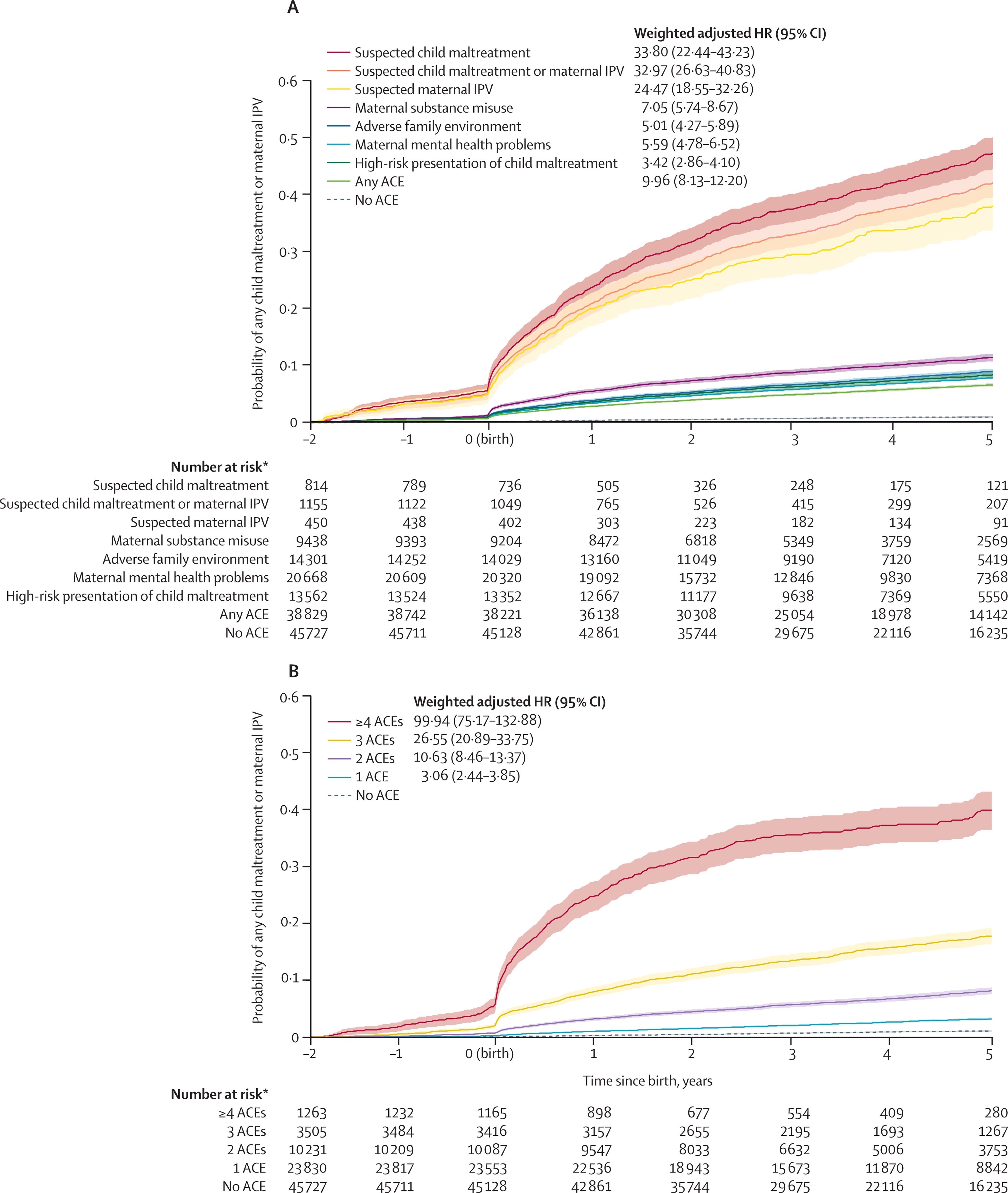 New Lancet Digital study shows more than 1 in 3 children and mothers in England have adverse childhood experiences (ACEs) recorded in their electronic health records, according to clinically relevant indicators.
New Lancet Digital study shows more than 1 in 3 children and mothers in England have adverse childhood experiences (ACEs) recorded in their electronic health records, according to clinically relevant indicators.
How I cope: a young person's guide

How I cope: a young person's guide is a new resource created by young people for young people about how young people cope and like to receive support. It was developed by CPRU, with the HeadStart Learning Team, and the HeadStart National Young People's Group.
New project on cost of child maltreatment
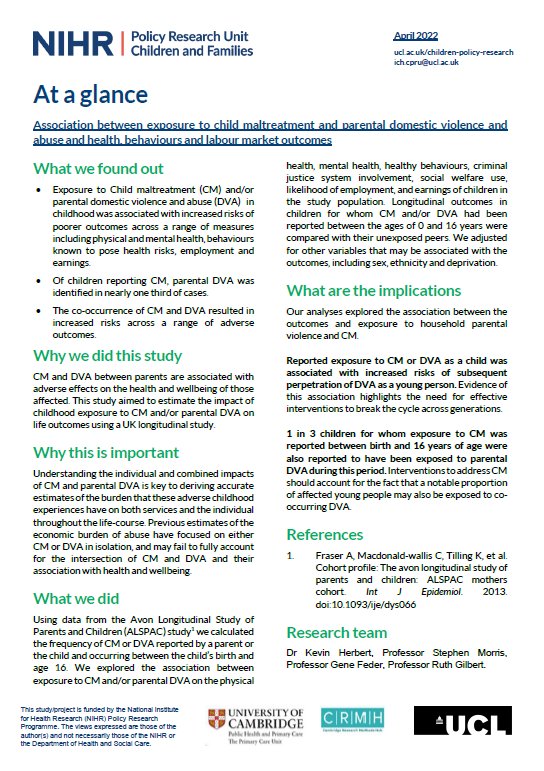
We explored the association between exposure to child maltreatment and parental domestic violence and abuse and health, behaviours and labour market outcomes.
Exposure to child maltreatment and/or parental domestic vioelnce and abuse in childhood was associated with increased risks of poorer outcomes across a range of measures including physical and mental health, behaviours known to pose health risks, employment and earnings.
New project on access to primary care
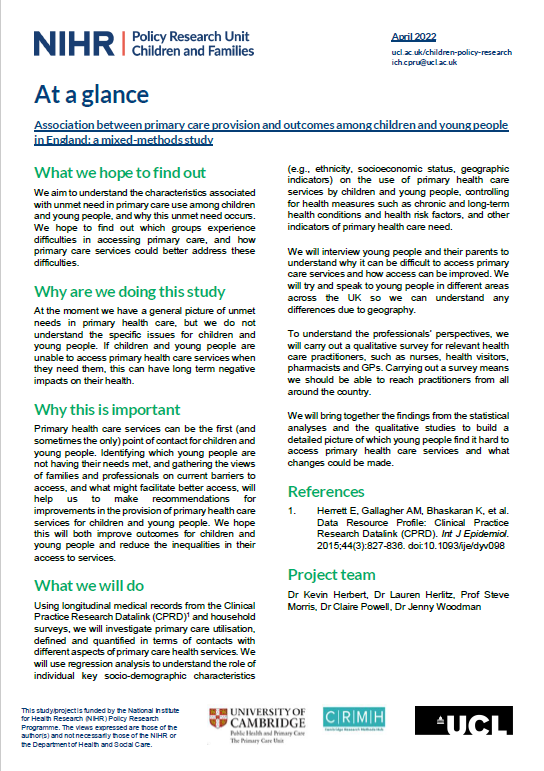
We aim to understand the characteristics associated with unmet need in primary care use among children and young people, and why this unmet need occurs.
We hope to find out which groups experience difficulties in accessing primary care, and how primary care services could better address these difficulties.
New project on promoting safe sleeping for babies in high risk groups in England
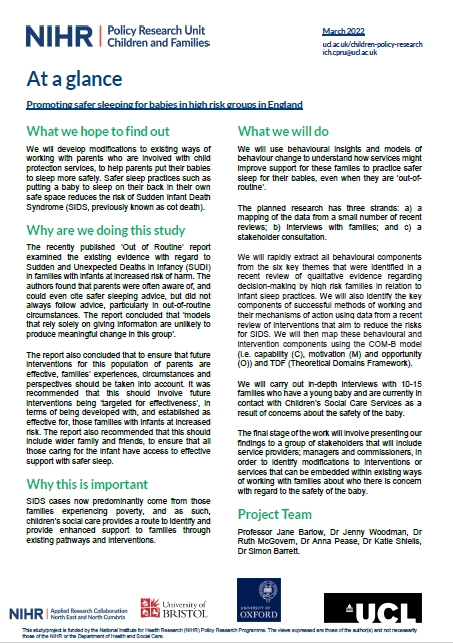
We will develop modifications to existing ways of working with parents who are involved with child protection services, to help parents put their babies to sleep more safely. Safer sleep practices such as putting a baby to sleep on their back in their own safe space reduce the risk of Sudden Infant Death Syndrome.
CPRU explores programme implementers' perspectives on collecting and using cost data
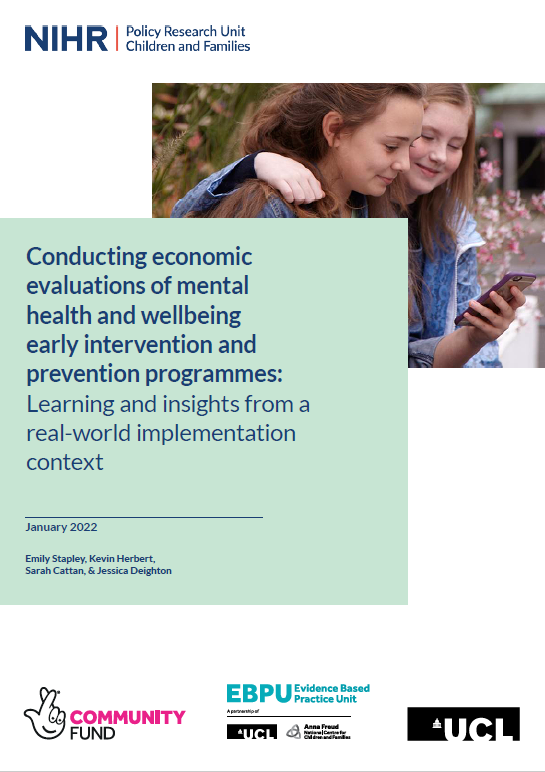
The cost of mental illness to the UK economy is estimated at £70-100 billion each year. Mental disorders are rising among children and adolescents in the UK. Economic evaluations of prevention and early intervention programmes are important to ensure that public resources are spent on delivering cost-effective interventions, where costs are outweighed by benefits. Understanding barriers and facilitators for collecting and using cost data is needed to design robust economic evaluations.
What we found out
- Programme sites varied in terms of how much cost data they had collected, the extent to which they had begun planning or implementing local cost data analysis, and the degree to which they ascribed importance to cost data analysis as compared to impact data analysis.
- The relative importance of cost data collection, analysis, and presentation to programme implementors may be driven in part by their perceptions of audience priorities (such as those of schools, the community, or commissioners).
- Barriers to collecting and using cost data include the difficulties of costing a complex programme, contextual constraints, missing data, and the limitations of economic evaluation tools.
CPRU develops core outcome sets for family and child-focused interventions for child maltreatment and domestic abuse
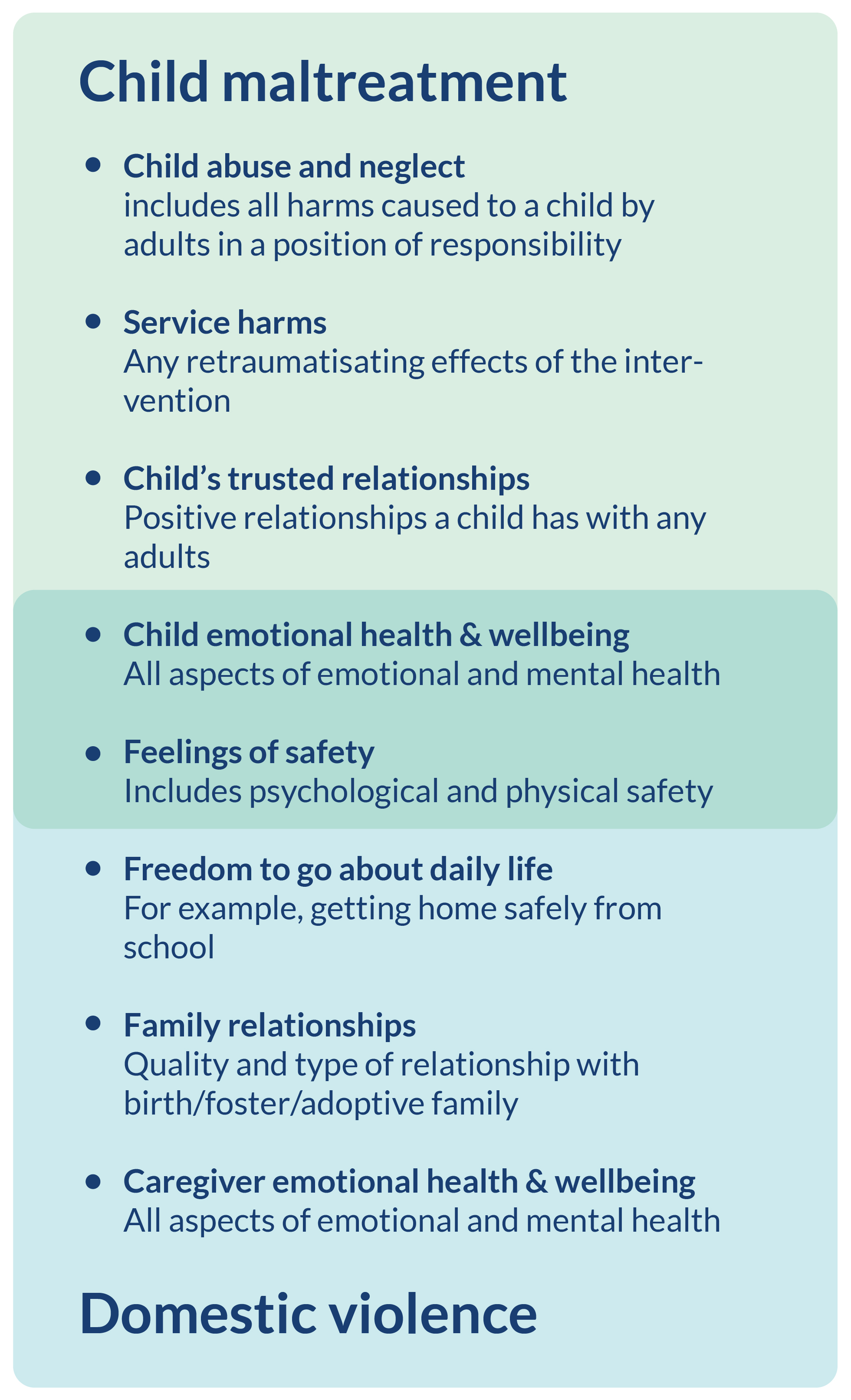
We developed two core outcome sets that those who use, deliver and commission services agreed were the most important to measure.
CPRU reports on changes in hospital contacts during the COVID-19 pandemic among vulnerable children and young people
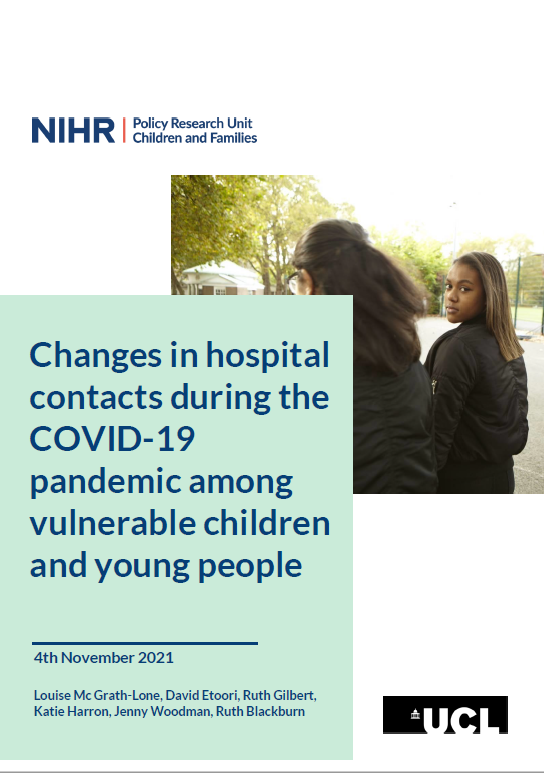
We found that vulnerable children bore large and disproportionate deficits in hospital contacts during the first nine months of the pandemic. These deficits were greatest for children with multiple vulnerabilities.
New data resource: Dashboard on Special Educational Needs in England
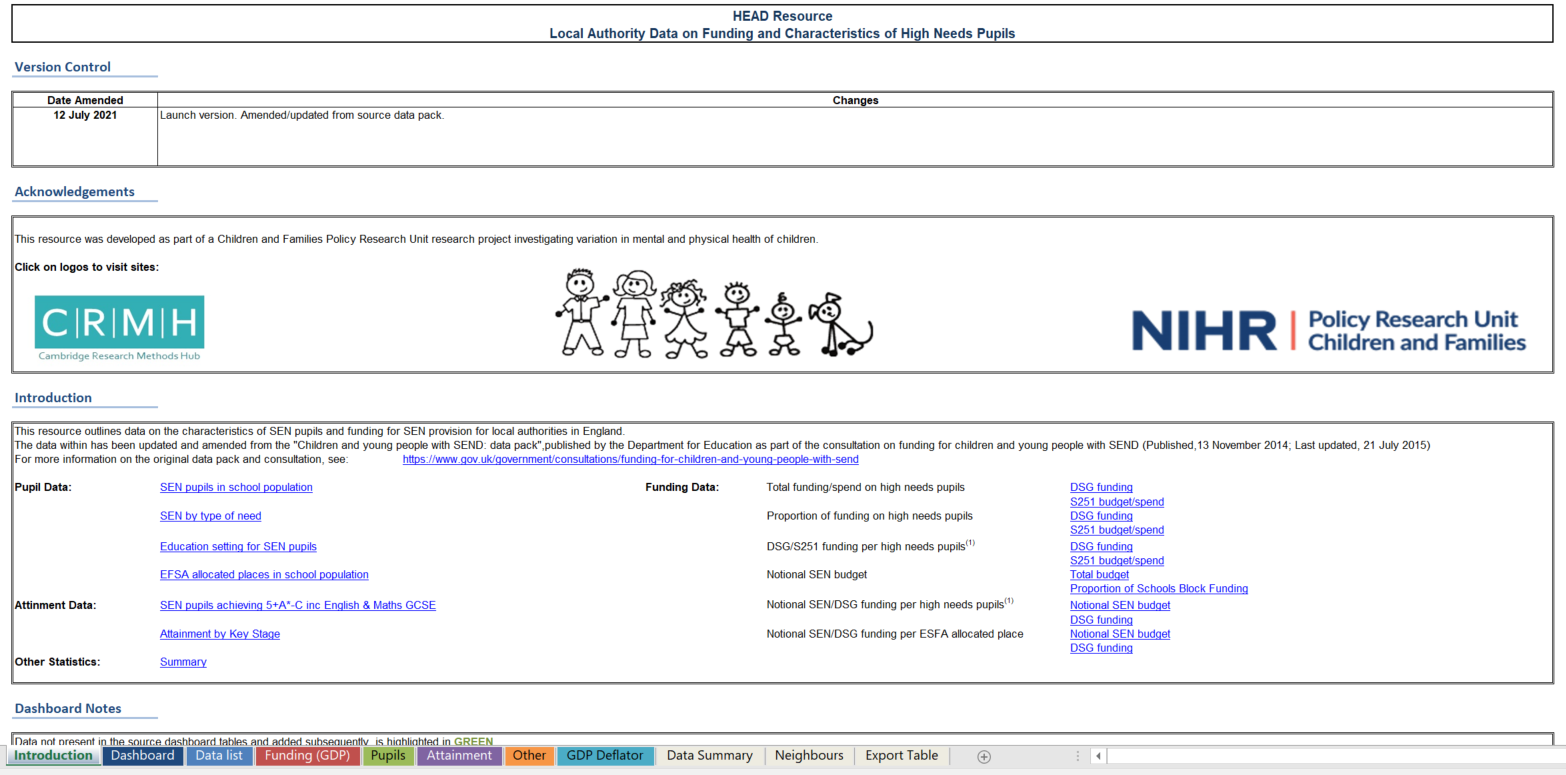
We have developed a resource that outlines data on the characteristics of SEN pupils and funding for SEN provision for local authorities in England.
Access Dashboard (for full functionality download copy to your computer)
Are infant mortality rates increasing in England?
Infant mortality (deaths in babies aged less than one year old) has been declining over past decades in England. Recently published data show that infant mortality appears to be going up since 2014, with some linking this trend to increases in child poverty. We used routinely published data from Office for National Statistics (openly available online) to explore why infant mortality might be going up.
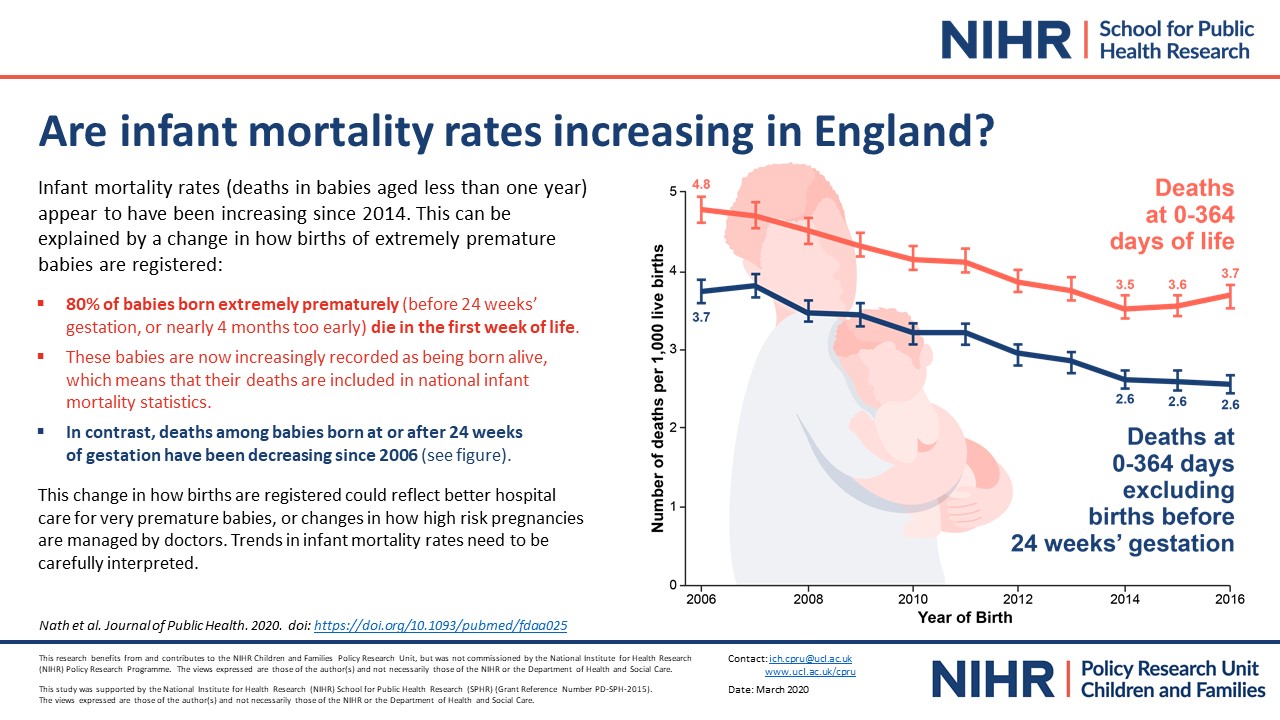
Dyslexia and Mental Health
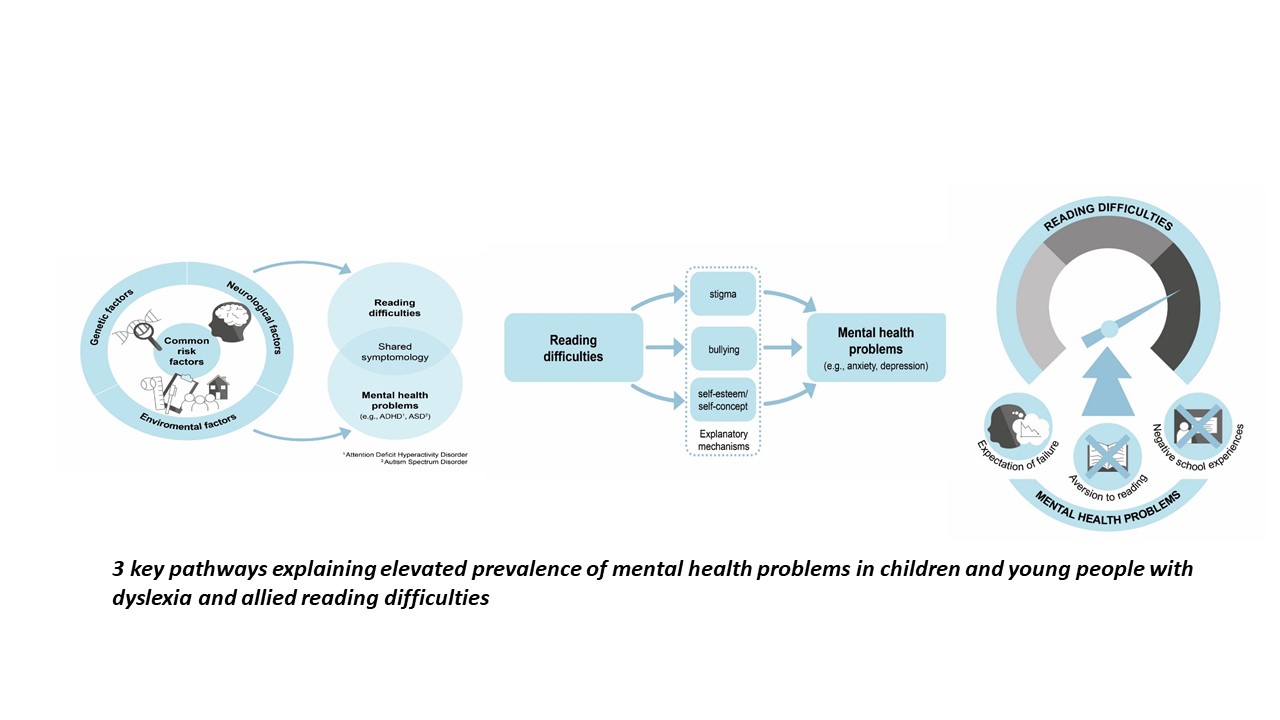
Higher levels of mental health problems in those with reading difficulties such as dyslexia are widely recognised. But the reasons for this are less clear. Our rapid review looked at existing evidence on the relationship between poor reading ability and/or reading disorders including dyslexia, and mental health problems.
We found three key pathways that explain the raised levels of prevalence.
Using the community services dataset (CSDS) for research on health visiting
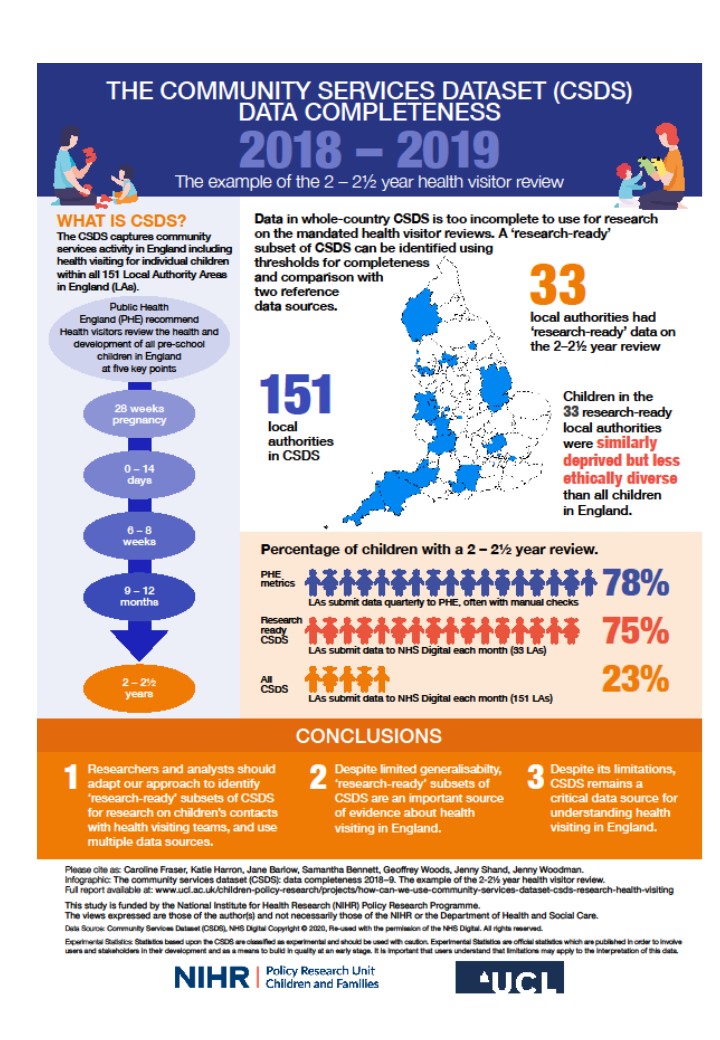
Health visiting is a national service focused on promoting the health and development of young children and reducing the impact of adversity and inequalities. Information about health visiting activity in England is collected in the Community Services Dataset (CSDS). The CSDS has not yet been used for research. We investigated the completeness and accuracy of dataset by looking specifically at the delivery of the 2-2.5 year review.
 Close
Close


